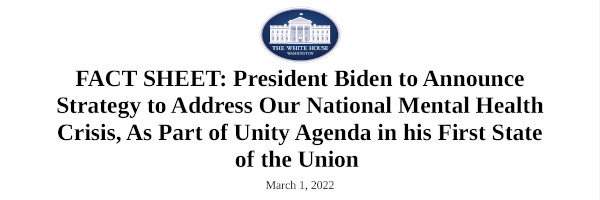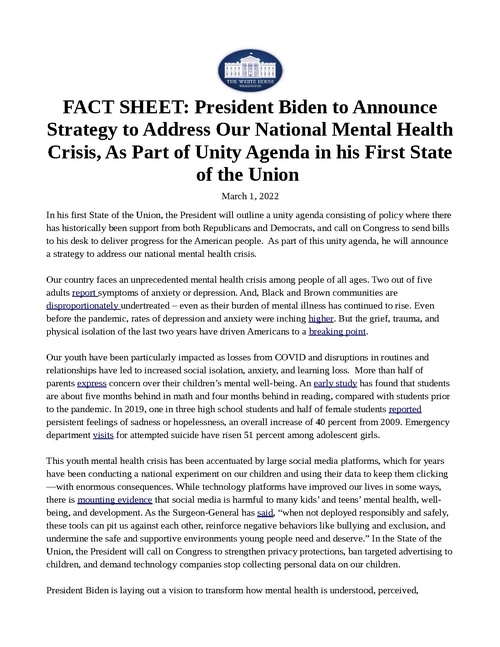Strategy to Address Our National Mental Health Crisis: Difference between revisions
Created page with "{{News |Image=Strategy to Address Our National Mental Health Crisis.jpeg |Published=2022-03-01 |Organization=The White House |Where=Washington DC |Summary=The President’s FY..." |
No edit summary |
||
| Line 7: | Line 7: | ||
|Link=https://www.whitehouse.gov/briefing-room/statements-releases/2022/03/01/fact-sheet-president-biden-to-announce-strategy-to-address-our-national-mental-health-crisis-as-part-of-unity-agenda-in-his-first-state-of-the-union/ | |Link=https://www.whitehouse.gov/briefing-room/statements-releases/2022/03/01/fact-sheet-president-biden-to-announce-strategy-to-address-our-national-mental-health-crisis-as-part-of-unity-agenda-in-his-first-state-of-the-union/ | ||
|Display=Yes | |Display=Yes | ||
|sector=Wellbeing | |||
|Release=White House Strategy to Address Our National Mental Health Crisis.pdf | |Release=White House Strategy to Address Our National Mental Health Crisis.pdf | ||
}} | }} | ||
Latest revision as of 17:26, March 25, 2022
| News | |
| Image | 
|
|---|---|
| Published | 2022-03-01 |
| Point(s) of Contact | |
| Organization(s) | The White House |
| Where | Washington DC |
| Display | Yes |

| |
The President’s FY23 budget will invest $700 million in programs – like the National Health Service Corps, Behavioral Health Workforce Education and Training Program, and the Minority Fellowship Program – that provide training, access to scholarships and loan repayment to mental health and substance use disorder clinicians committed to practicing in rural and other underserved communities.
In his first State of the Union, the President will outline a unity agenda consisting of policy where there has historically been support from both Republicans and Democrats, and call on Congress to send bills to his desk to deliver progress for the American people. As part of this unity agenda, he will announce a strategy to address our national mental health crisis.
Our country faces an unprecedented mental health crisis among people of all ages. Two out of five adults report symptoms of anxiety or depression. And, Black and Brown communities are disproportionately undertreated – even as their burden of mental illness has continued to rise. Even before the pandemic, rates of depression and anxiety were inching higher. But the grief, trauma, and physical isolation of the last two years have driven Americans to a breaking point.
Our youth have been particularly impacted as losses from COVID and disruptions in routines and relationships have led to increased social isolation, anxiety, and learning loss. More than half of parents express concern over their children’s mental well-being. An early study has found that students are about five months behind in math and four months behind in reading, compared with students prior to the pandemic. In 2019, one in three high school students and half of female students reported persistent feelings of sadness or hopelessness, an overall increase of 40 percent from 2009. Emergency department visits for attempted suicide have risen 51 percent among adolescent girls.
This youth mental health crisis has been accentuated by large social media platforms, which for years have been conducting a national experiment on our children and using their data to keep them clicking—with enormous consequences. While technology platforms have improved our lives in some ways, there is mounting evidence that social media is harmful to many kids’ and teens’ mental health, well-being, and development. As the Surgeon-General has said, “when not deployed responsibly and safely, these tools can pit us against each other, reinforce negative behaviors like bullying and exclusion, and undermine the safe and supportive environments young people need and deserve.” In the State of the Union, the President will call on Congress to strengthen privacy protections, ban targeted advertising to children, and demand technology companies stop collecting personal data on our children.
President Biden is laying out a vision to transform how mental health is understood, perceived, accessed, treated, and integrated – in and out of health care settings. The American Rescue Plan laid the groundwork, providing critical investments to expand access to mental health services. Now, far more is needed to ensure that everyone who needs help can access care when and where they seek it.
The President is announcing a national mental health strategy to strengthen system capacity, connect more Americans to care, and create a continuum of support –transforming our health and social services infrastructure to address mental health holistically and equitably.